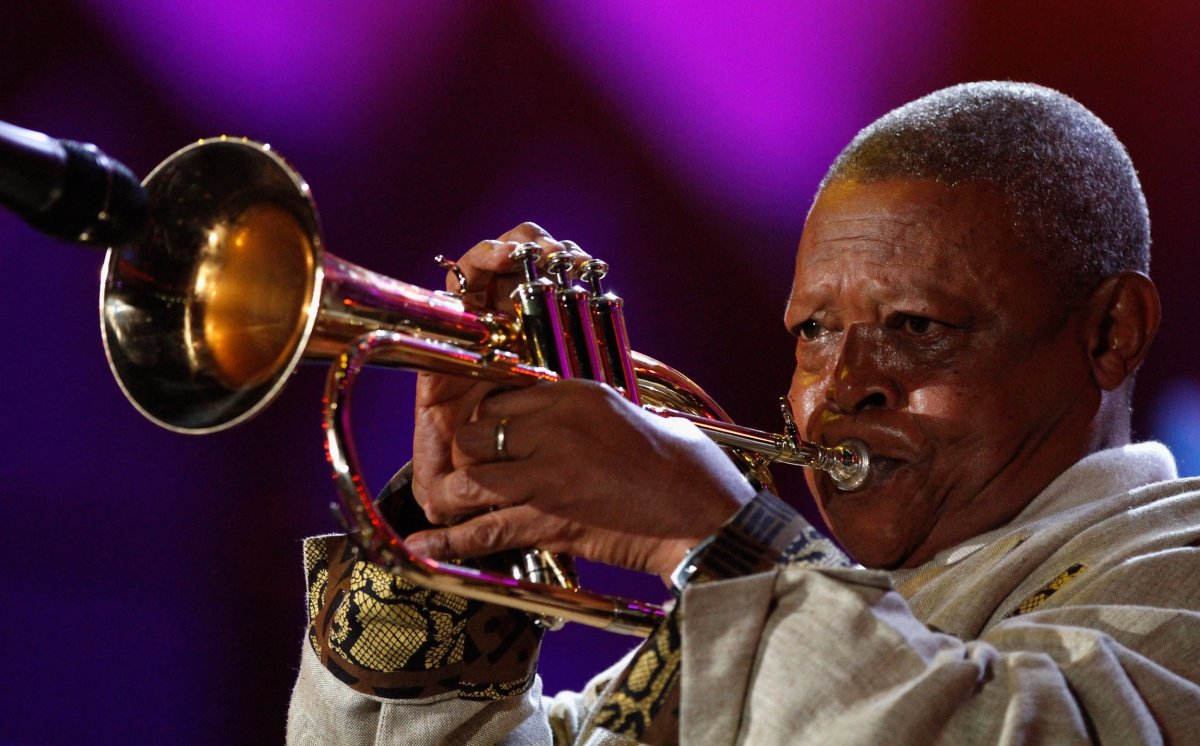Thursday's Google Doodle pays tribute to Hugh Masekela, a legendary South African jazz musician and anti-apartheid activist.
The Doodle marks what would have been Masekela's 80th birthday. The musician died in the South African city of Johannesburg in January 2018. He was 78 when he passed away, ending a 10-year battle with prostate cancer.
Born in 1939 in the coal-mining town of Witbank in the north of the country, Masekela's music career began at 14 when he began playing the horn, according to the Google blog post explaining today's Doodle.
He quickly found himself a part of the local music scene, and in the 1950s became part of the first all-black jazz band in South African history to record an album—the "Jazz Epistles." But the band members soon became victims of their own success. The country's racist apartheid government forced the group into exile, which for Masekela—known locally as "Bra Hugh"—would last some 30 years.
Aged 21, he travelled across the Atlantic Ocean to New York City, where he became a student at the Manhattan School of Music. He immersed himself in the city's vibrant jazz community. He brushed shoulders with many great stars, including Miles Davis, who once told him, "You're just going to be a statistic if you play jazz, but if you put in some of the stuff you remember from South Africa, you'll be different from everybody."
Following this advice, Masekela's debut album—the 1963 "Trumpet Africaine"—was a key step in developing his own unique African jazz style. Throughout that decade Masekela's musical character would be further honed, while it also spread the activist message against continued white minority in his home country. "My biggest obsession is to show Africans and the world who the people of Africa really are," the musician once said.
During his time in the U.S., Masekela developed links to the Black Power movement. He also claimed that South African authorities had passed information about him to the American government, and that his phone was tapped in New York, The Guardian noted. In 1966, he played at the Watts Festival in Los Angeles to mark the anniversary of the riots that took place there one year before.
By the end of the decade he had moved to Los Angeles and scored a number 1 chart hit with the 1968 single "Grazin' in the Grass." As his reputation spread, he also collaborated with artists including Fela Kuti, Bob Marley, Marvin Gaye, Paul Simon, and Stevie Wonder.
One of his most famous anti-apartheid tunes was the 1987 song "Bring Him Back Home," written in honor of African National Congress freedom fighter Nelson Mandela, then still imprisoned. The song became one of the most popular anthems for those still fighting the white South African government, The Independent explained.
And in 1990, Masekela returned to his country of birth to see Mandela freed. When the leader was elected South Africa's first black president in 1994, "Bring Him Back Home" was the soundtrack.
Masekela released more than 40 albums during his career, the Associated Press said. The musician continued touring until late 2017, just months before he passed away.
After he died in April 2018, his son Selema told the AP that "millions of people from across this world have shown their love" for his father, who had "laughter and humor to the very end."

Uncommon Knowledge
Newsweek is committed to challenging conventional wisdom and finding connections in the search for common ground.
Newsweek is committed to challenging conventional wisdom and finding connections in the search for common ground.
About the writer
David Brennan is Newsweek's Diplomatic Correspondent covering world politics and conflicts from London with a focus on NATO, the European ... Read more
To read how Newsweek uses AI as a newsroom tool, Click here.








